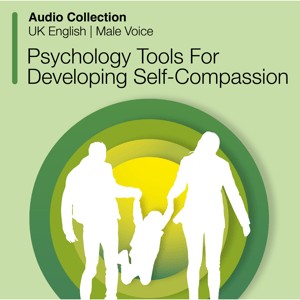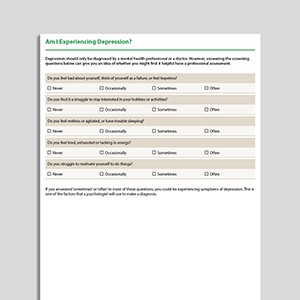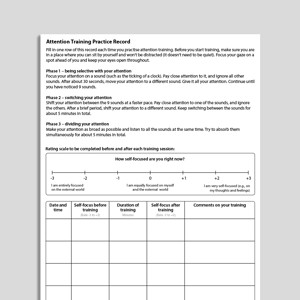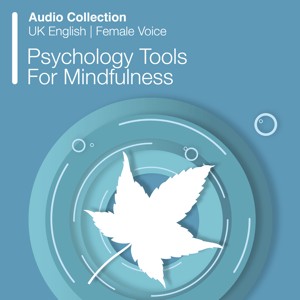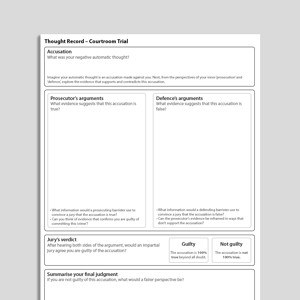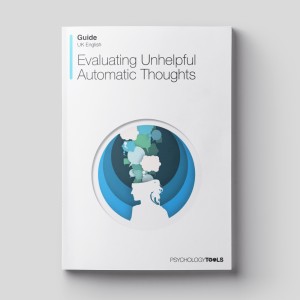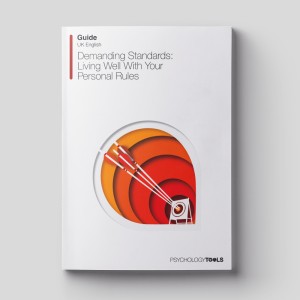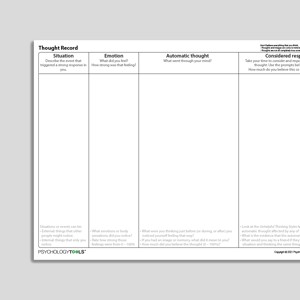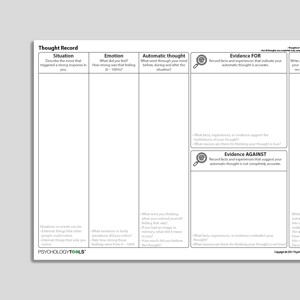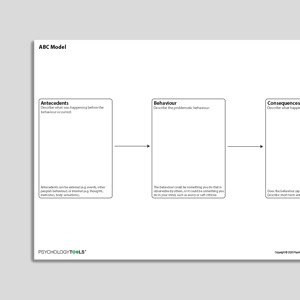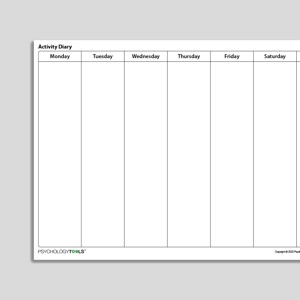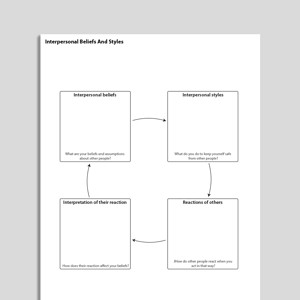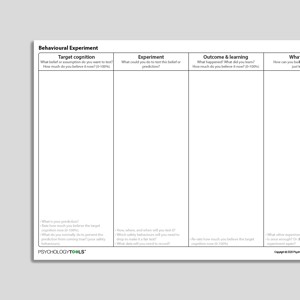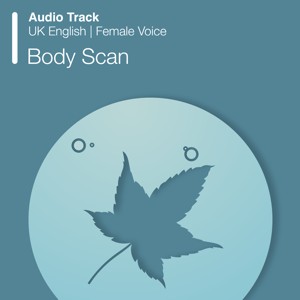Depression
Depression is characterized by an extended period of low mood, anhedonia, and reduction in activity. Dysthymia (persistent depressive disorder) is characterized by a depressed mood that occurs for most of the day, more days than not, and has been present for at least two years. Depression is a heterogeneous condition with many different triggers, presentations, and maintaining factors. Cognitive behavioral therapies (including acceptance and commitment therapy (ACT), cognitive behavioral therapy (CBT), compassion focused therapy (CFT), and dialectical behavior therapy (DBT) are effective evidence-based treatment for depression, and mindfulness-based cognitive therapy (MBCT) is an effective intervention for preventing the recurrence of depression.
Audio Collection: Psychology Tools For Developing Self-Compassion
Audio Collection: Psychology Tools For Developing Self-Compassion
Attention Training Practice Record
Attention Training Practice Record
Audio Collection: Psychology Tools For Mindfulness
Audio Collection: Psychology Tools For Mindfulness
Changing Avoidance (Behavioral Activation)
Changing Avoidance (Behavioral Activation)
Overcoming Depression (Second Edition): Workbook
Overcoming Depression (Second Edition): Workbook
Overcoming Depression (Second Edition): Therapist Guide
Overcoming Depression (Second Edition): Therapist Guide
Thought Record – Courtroom Trial
Thought Record – Courtroom Trial
Evaluating Unhelpful Automatic Thoughts
Discounting In Perfectionism – The Ratchet Effect
Discounting In Perfectionism – The Ratchet Effect
Demanding Standards – Living Well With Your Personal Rules
Demanding Standards – Living Well With Your Personal Rules
Self-Monitoring Record (Universal)
Self-Monitoring Record (Universal)
Boundaries - Self-Monitoring Record
Boundaries - Self-Monitoring Record
Uncertainty Beliefs – Experiment Record
Uncertainty Beliefs – Experiment Record
Depression - Self-Monitoring Record
Depression - Self-Monitoring Record
Rumination - Self-Monitoring Record
Rumination - Self-Monitoring Record
Negative Thoughts - Self-Monitoring Record
Negative Thoughts - Self-Monitoring Record
What Keeps Depression Going?
What Keeps Depression Going?
Thought Record (Considered Response)
Thought Record (Considered Response)
Thought Record (Evidence For And Against)
Thought Record (Evidence For And Against)
What Do People Think About Themselves (CYP)?
What Do People Think About Themselves (CYP)?
Activity Diary (Hourly Time Intervals)
Activity Diary (Hourly Time Intervals)
Activity Diary (No Time Intervals)
Activity Diary (No Time Intervals)
Using Behavioral Activation To Overcome Depression
Using Behavioral Activation To Overcome Depression
Behavioral Activation Activity Planning Diary
Behavioral Activation Activity Planning Diary
Behavioral Activation Activity Diary
Behavioral Activation Activity Diary
Interpersonal Beliefs And Styles
Interpersonal Beliefs And Styles
Cognitive Behavioral Model Of Intolerance Of Uncertainty And Generalized Anxiety Disorder Symptoms (Hebert, Dugas, 2019)
Cognitive Behavioral Model Of Intolerance Of Uncertainty And Generalized Anxiety Disorder Symptoms (Hebert, Dugas, 2019)
Intolerance Of Uncertainty
Intolerance Of Uncertainty
What Does Exercise Do For the Mind And Body?
What Does Exercise Do For the Mind And Body?
Exercise For Mental Health
Exercise For Mental Health
Mindfulness In Everyday Life (Audio)
Mindfulness In Everyday Life (Audio)
Mindfulness Of Breath (Long Version) (Audio)
Mindfulness Of Breath (Long Version) (Audio)
Mindfulness Of Sounds And Thoughts (Audio)
Mindfulness Of Sounds And Thoughts (Audio)
Mindfulness Of Breath (Short Version) (Audio)
Mindfulness Of Breath (Short Version) (Audio)
Transdiagnostic Processes
Transdiagnostic Processes
Links to external resources
Psychology Tools makes every effort to check external links and review their content. However, we are not responsible for the quality or content of external links and cannot guarantee that these links will work all of the time.
Assessment
- Valued Living Questionnaire (Version 2) | Wilson, Groom | 2002
-
Ruminative responses scale
| Treynor, Gonzalez, Nolen-Hoeksema | 2003
- Scale
-
Edinburgh Post Natal Depression Scale (EPDS)
| Cox, Holden, Sagovsky | 1987
- Scale
- Cox, J. L., Holden, J. M., & Sagovsky, R. (1987). Detection of postnatal depression: development of the 10-item Edinburgh Postnatal Depression Scale. The British Journal of Psychiatry, 150(6), 782-786.
-
Hamilton Rating Scale For Depression (HAM-D)
| Hamilton | 1960
- Scale
- Hamilton M. (1960). A rating scale for depression. J Neurol Neurosurg Psychiatry, 23, 56–62.
-
Montgomery & Asberg Depression Rating Scale (MADRS)
| Montgomery, Asberg | 1979
- Scale
- MADRS Score Card
- Montgomery, S.A., Asberg, M. (1979). A new depression scale designed to be sensitive to change. British Journal of Psychiatry, 134 (4): 382–89.
-
Patient Health Questionnaire 9 (PHQ-9)
| Kroenke, Spitzer | 2002
- Scale phqscreeners.com
- Kroenke, K., & Spitzer, R. L. (2002). The PHQ-9: a new depression diagnostic and severity measure. Psychiatric annals, 32(9), 509-515.
-
Severity Measure For Depression – Adult (Adapted from the Patient Health Questionnaire–9 (PHQ-9))
| APA (Spitzer, Williams, Kroenke and colleagues)
- Scale – Adult
- Scale – Child Age 11-17
-
Zung Self-Rating Depression Scale
| Zung | 1965
- Scale
- Reference Zung, W. W. (1965). A self-rating depression scale. Archives of General Psychiatry, 12(1), 63-70.
-
Clinically Useful Depression Outcome Scale (CUDOS)
| Zimmerman, Chelminski, McGlinchey, Posternak | 2008
- Scale
- Zimmerman, M., Chelminski, I., McGlinchey, J. B., & Posternak, M. A. (2008). A clinically useful depression outcome scale. Comprehensive psychiatry, 49(2), 131-140.
Case Conceptualization / Case Formulation
- Cognitive conceptualisation (excerpt from Basics and Beyond) | J. Beck
- Developing and using a case formulation to guide cognitive behaviour therapy | Persons | 2015
Guides and workbooks
- Mood And Substance Use | NDARC: Mills, Marel, Baker, Teesson, Dore, Kay-Lambkin, Manns, Trimingham | 2011
- The Path to Positivity: Six Practical Sections for Becoming a More Positive Person | Caroline Lavelock, Everett Worthington | 2013
Information Handouts
-
Depression (Information Handouts)
| Centre For Clinical Interventions
- What Is Depression?
- What Causes Depression?
- Psychotherapy for Depression
- Vicious Cycle of Depression
- Behavioural Activation: Fun and Achievement
- Fun Activities Catalogue
- Improving How You Feel
- Thinking and Feeling
- Analysing Your Thinking
- Changing Your Negative Thinking
- Unhelpful Thinking Styles
- What Are Core Beliefs?
- Problem Solving
- Staying Healthy
- Grief and Bereavement
Information (Professional)
- Get out of the TRAP and back on TRAC (for rumination and worry) | GoodMedicine
Self-Help Programmes
-
Behavioral Activation For Depression
| Southwark Psychological Therapies Service | 2012
- Introduction to BA for depression
- Monitoring Activity And Mood
- Roadmap: The Activation Plan
- Finding Direction: Values, Flow, And Strengths
- Avoidance And Depression TRAPs
- Thinking Habits
- Next Steps
-
Back from the Bluez (Workbook)
| Centre For Clinical Interventions | 2003
- Module 1: Overview of Depression
- Module 2: Behavioural Strategies for Managing Depression
- Module 3: The Thinking-Feeling Connection
- Module 4: The ABC Analysis
- Module 5: Unhelpful Thinking Styles
- Module 6: Detective Work and Disputation
- Module 7: The End Result
- Module 8: Core Beliefs
- Module 9: Self-Management
-
Back From The Bluez (Workbook)
| Centre For Clinical Interventions | 2003
- Module 1: Overview Of Depression
- Module 2: Behavioral Strategies For Managing Depression
- Module 3: The Thinking-Feeling Connection
- Module 4: The ABC Analysis
- Module 5: Unhelpful Thinking Styles
- Module 6: Detective Work And Disputation
- Module 7: The End Result
- Module 8: Core Beliefs
- Module 9: Self Management
Treatment Guide
- Metacognitive Training For Depression (D-MCT) Manual | Jelinek, Schneider, Hauschild, Moritz | 2023
- Suicide and self injury: a practitioners guide | Forensic Psychology Practice Ltd | 1999
- Depression In Adults: Treatment And Management (NICE Guideline) | NICE | 2022
- Behavioural activation treatment for depression (BATD) manual | Lejuez, Hopko & Hopko | 2001
-
Metacognitive Training For Depression
| Jelinek, Hauschildt, Moritz & Schneider | 2022
- Module 1: Thinking and reasoning 1
- Module 2: Memory
- Module 3: Thinking and reasoning 2
- Module 4: Self-worth
- Module 5: Thinking and reasoning 3
- Module 6: Behaviors and strategies
- Module 7: Thinking and reasoning 4
- Module 8: Perception of feelings
- Cognitive-behavioral therapy for depression in young people: a modular treatment manual | Orygen | 2015
- Depression In Adults: Recognition And Management | National Institute for Health and Care Excellence (NICE) guidelines | 2009
- Individual therapy manual for cognitive-behavioural treatment of depression | Ricardo Muñoz, Jeanne Miranda | 1996
- Manual for group cognitive-behavioral therapy of major depression: a reality management approach (Instructor’s manual) | Muñoz, Ippen, Rao, Le, Dwyer | 2000
- Cognitive-Behavioural Therapy (CBT) Group Program For Depression | Milner, Tischler, DeSena, Rimer
- Cognitive behaviour therapy for depression in young people: manual for therapists | Improving Mood with Psychoanalytic and Cognitive Therapies (IMPACT) Study CBT Sub-Group | 2010
- CBT For Depression In Veterans And Military Service Members – Therapist Manual | Wenzel, Brown, Carlin | 2011
- Group therapy manual for cognitive behavioral treatment of depression | Muñoz, Miranda | 1993
- Behavioural activation treatment for depression – revised (BATD-R) manual | Lejuez, Hopko, Acierno, Daughters, Pagoto | 2011
Worksheets
-
Depression (Worksheets)
| Centre For Clinical Interventions
- Symptoms of Depression
- Behavioural Activation
- My Behavioural Antidepressants
- Weekly Activity Schedule
- Weekly Goals Record
- Making the Connection (Between Thoughts and Feelings)
- Thought Diary 1
- Thought Diary 2
- Thought Diary 3
- Thought Diary (Tri-fold)
- Core Beliefs Worksheet
- Healthy Me
- Goal Setting (End of Therapy)
Recommended Reading
- Behavioural activation treatment for depression: returning to contextual roots | Jacobson, Martell, Dimidjian | 2001
What Is Depression?
Signs and Symptoms of Depression
To meet DSM-5 diagnostic criteria for major depressive disorder an individual must have experienced five of the following symptoms for at least two weeks:
a depressed mood that is present most of the day, nearly every day
diminished interest in activities which were previously experienced as pleasurable
fatigue or a loss of energy
sleep disturbance (insomnia or hypersomnia)
feelings of worthlessness, self-reproach, or excessive guilt
a diminished ability to think or concentrate, or indecisiveness
recurrent thoughts of death or suicide, or suicidal behavior
changes in appetite marked by a corresponding weight change
psychomotor agitation or retardation to a degree which is observable by others
Psychological Models and Theory of Depression
Beck’s cognitive theory of depression (Beck, Rush, Shaw, & Emery, 1979) forms the basis for cognitive behavioral approaches for the treatment of depression. Beck’s theory proposes that there are different levels of cognition that can be dysfunctional in depression: core beliefs, rules and assumptions, and negative automatic thoughts. CBT aims to balance negatively biased cognition with more rational and accurate thoughts, beliefs, and assumptions. CBT also systematically aims to increase levels of rewarding activity.Acceptance and commitment therapy (ACT) proposes that distress, including symptoms of depression, are the result of psychological inflexibility (Hayes, Luoma, Bond, Masuda, & Lillis, 2006). Indicators of psychological inflexibility include:
‘buying in’ to negative thoughts and narratives;
engaging in worry or rumination that takes us away from the present moment;
losing contact with our values—what is important to us.
Evidence-Based Psychological Approaches for Working with Depression
Many psychological therapies have an evidence base for working with depression:
Mindfulness-based cognitive therapy (MBCT) for preventing relapse
Resources for Working with Depression
Psychology Tools resources available for working therapeutically with depression may include:
psychological models of depression
information handouts for depression
exercises for depression
CBT worksheets for depression
self-help programs for depression
References
Beck, A. T., Rush, A. J., Shaw, B. F., & Emery, G. (1979). Cognitive therapy of depression. New York: Guilford Press.
Hayes, S. C., Luoma, J. B., Bond, F. W., Masuda, A., & Lillis, J. (2006). Acceptance and commitment therapy: Model, processes and outcomes. Behaviour Research and Therapy, 44(1), 1–25.



